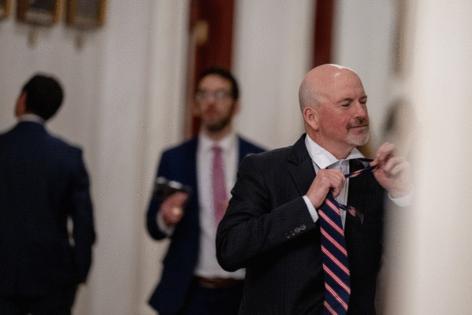Top Pennsylvania Democrat beats an anti-robocall lawsuit in federal appeals court
Published in News & Features
Andrew Perrong is on a mission to eliminate robocalls. The 28-year-old lawyer began suing companies that call people en masse with prerecorded messages when he was in high school.
Now, the Third Circuit Court of Appeals has issued a first-of-its-kind robocall ruling in a case Perrong filed as a law student at Temple University.
But the anti-robocall advocate lost.
A trio of judges ruled that the federal law that restricts robocalling does not apply to state legislators conducting government business, and reversed a lower court's decision that would have allowed a lawsuit Perrong filed against Pennsylvania House of Representatives Majority Leader Matthew Bradford to proceed to trial.
Karl Myers, an attorney with Stevens & Lee who represented the Montgomery County Democrat, said in a statement that the court ruling would help ensure that constituents receive beneficial information.
The federal law "was meant to stop harassing and fraudulent commercial robocalls, not calls from state legislators offering programs for the public's benefit," Myers said.
Perrong sued Bradford in 2023 over five calls he received between September 2019 and December 2020. One featured a prerecorded message of Bradford's voice promoting an information session for Pennie, Pennsylvania's Affordable Care Act insurance marketplace.
Bradford must have used an automated dialing system to spread the messages, the suit claims, as Perrong wasn't one of his constituents and not in need of health insurance.
The complaint argued that the calls violated the Telephone Consumer Protection Act, a federal law that prohibits the use of robocalls in nonemergency situations.
Perrong said in the complaint that he "was harmed by the calls" as he "was temporarily deprived of legitimate use of his telephone and his privacy was improperly invaded." He also says in the complaint that the calls were "frustrating, obnoxious, annoying, were a nuisance and disturbed [his] solitude."
Bradford argued calls made by government officials conducting official business weren't covered by the federal law.
All five calls were placed by Bradford "in his official capacity as a State Representative and were within his official duties," the representative's attorney said in court filings.
State legislator groups supported Bradford throughout the litigation, including the Republican House and Senate caucuses.
But District Judge Joshua Wolson wasn't convinced and allowed the litigation to proceed.
"When it comes to robocalls, you can only call those who, like Blondie, have said, 'Call me. Call me on the line,'" Wolson wrote in May 2024. " If you call people who haven't opted in, then you face liability."
Bradford appealed to the Third Circuit, which reversed Wolson's decision.
The Third Circuit noted that it was the first time it had been asked to review whether the federal prohibition on robocalls covers government officials conducting government functions.
The judges found that the robocalls placed by Bradford — including about health insurance, 2020 census employment opportunities, and government services access during COVID-19 — were made for "public benefit" rather than "private indulgence."
"Such communications related to the health, safety and general welfare of the people clearly serve the 'public good' — as opposed to any personal affairs or a reelection campaign," Senior Judge Anthony Scirica wrote.
Perrong said that he was honored to argue in front of the Third Circuit so early in his legal career, and respects but disagrees with the ruling. He is assessing his next step.
"I don't wish to receive prerecorded calls from anybody," Perrong said. "I don't feel that politicians should get a free pass."
©2025 The Philadelphia Inquirer, LLC. Visit at inquirer.com. Distributed by Tribune Content Agency, LLC.







Comments